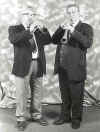Chronis Aidonidis
with the Nikos Flilippidis Ensemble
 Chronis
Aidonidis,
the best-known performer of songs of Thrace, whose reputation and popularity are on a
national scale, was born in 1928 in Karoti, near Didymoteichon, Thrace, the son of a
priest. He grew up with the sounds of the folk tunes sung by his mother, Chrysanthi, whose
fine voice was influenced by church chants and the slow songs of Eastern Thrace. From an
early young age he recorded in his memory the songs sung by the farmers in the fields, and
by the revelers in the village square on the major feast days, when the
“gentler” instruments would come to the village, oútis and
violins (“divine music” to eight year-old Chronis’ ears,) to join the
rougher sounding local zournádes, gáides and daoúlia. While in secondary school, he received
his first systematic lessons in Byzantine music from Michalis Kefalokoptis, a leading
local chief cantor from Eastern Thrace, and his first theoretical lessons from Manakas,
another cantor. Chronis
Aidonidis,
the best-known performer of songs of Thrace, whose reputation and popularity are on a
national scale, was born in 1928 in Karoti, near Didymoteichon, Thrace, the son of a
priest. He grew up with the sounds of the folk tunes sung by his mother, Chrysanthi, whose
fine voice was influenced by church chants and the slow songs of Eastern Thrace. From an
early young age he recorded in his memory the songs sung by the farmers in the fields, and
by the revelers in the village square on the major feast days, when the
“gentler” instruments would come to the village, oútis and
violins (“divine music” to eight year-old Chronis’ ears,) to join the
rougher sounding local zournádes, gáides and daoúlia. While in secondary school, he received
his first systematic lessons in Byzantine music from Michalis Kefalokoptis, a leading
local chief cantor from Eastern Thrace, and his first theoretical lessons from Manakas,
another cantor.
After
a year as a school teacher on a border village, he moved to Athens in 1950 and worked in a
variety of posts at the Sismanogleion Hospital until his retirement in 1988. In 1953 he
was persuaded to overcome his shyness and his unwillingness to “sing songs outside of
Thrace”, and he participated in a radio broadcast with the choir and orchestra of P.
Kavakopoulos, This was the first time that
songs of Western Thrace had been heard on the radio in their own homeland or anywhere else
in Greece – and what is more, they were accompanied by a band consisting of
traditional instruments. The musical contribution made by the singer Chronis Aidonidis to
shaping what is known today as the “Thracian Style” was undoubtedly very great.
Unlike areas such as southern Greece, Epirus, Crete and Asia Minor, there were no records
of the music of Thrace at all, either on 78 rpm or 45 rpm. Thrace, however, was extremely
lucky in finding such an important interpreter just as its music was beginning to be
disseminated by the mass media.
In
the late 1950’s, Chronis Aidonidis and Polydoros Papachristodoulou, a folklore expert
from Eastern Thrace, began to broadcast a radio program on which for about three years
only songs from Thrace were heard. Since then, Chronis’ career has been one of
continuous progress, and he has remained an exemplary amateur musician in the original sense of the word,
one who has avoided commercialization and the wear and tear of night club work, thus
giving the measure of the artistic and human ethos for which he is known.
In
recent years, Aidonidis has gained wide recognition, especially for his interpretations of
the slow, melismatic songs of Eastern Thrace with their characteristic Byzantine colour.
Thus in the case of Chronis Aidonidis we find the best incarnation of the view that Greek
folk song sprang from Byzantine music in an unbroken continuity, and this has done much to
gain him wider acceptance as an interpreter.
At
age 73, Aidonidis continues to work, without fuss, on the music of his homeland, and he
has collected hundreds of songs around the original core of those his mother taught him.
Those songs are disappearing day by day, and only a few of them have ever been issued on
disc. His own discography is relatively large, and it includes: Thacian Songs with
C.Aidonidis, Intersound 1980; Macedonian and Thracian Songs, Aidonidis, Recor 1980;
Musical Ornamentation of Thrace, Aidonidis, Intersound 1981; C. Aidonidis, The
Nightingales of the East, Songs of Thrace and Asia Minor with the participation of Yorgos
Dalaras, Minos 1990; Songs of Constantinople and the Propontis, SDNM 1978; Songs from the
fringes of Greece, Sinasos 1992; Constantinople is Fallen, Pella 1993.
Aidonidis
is a frequent performer on radio and television, in concerts and at other events, and he
has known and worked with many of the outstanding folk musicians in postwar Greece. |



